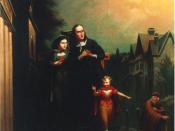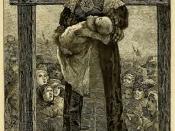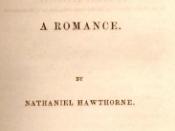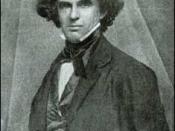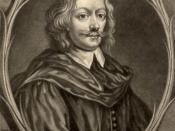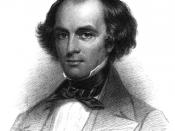Roger Chillingworth: a mad man, or a man driven to madness? This is a question that many readers of Hawthorne's "The Scarlet Letter" have decided by the time they reach the final chapter, really without thinking about it. Yet, if the story is reviewed, and one looks at the events that either happen directly because of Chillingworth, or how these events effected him, you may realize that he is a product, rather than a cause of pain. Throughout the work, it is clearly shown that he, like so many others over the time of history, is a product of earlier events and situations. And in these situations, he didn't make the right choice in how to handle the problem. He did not choose the rational path of problem solving. Even from the very beginning when he is faced with the fact that his wife has given her body to another man, he hides his identity and protects himself from being affiliated with her.
That being the first, and beginning example of his poor ability to decide the correct and rational solution to a problem or hard situation. So, because of this fact, he decides, or is more less driven to go to the devil in order to help his mortal self fulfill yet another bad decision...revenge.
From the first time Nathaniel Hawthorne begins to describe Dr. Prynne (a.k.a. Roger Chillingworth) he uses Hester to show that he is very normal in some aspects, yet very different in others. He is a mid aged man, whom wears his age well. But a small shoulder misalignment, causes slight distinction from the rest of the crowd. His facial features told of his intelligence, and his clothes were of a mix, some civilized, some savage. When he came onto the scene, while Hester was on the scaffold with baby Pearl, he hid his identity from the crowd, and merely asked of what the commotion was all about. The news hit him hard, yet, consistent with Chillingworth throughout the story, he does not show it with outward gestures. He asked one of the onlookers if she had told the name of the man whom took advantage of Hester, but was told that she would not break the privy. Chillingworth, filled with the bitterness of betrayal, confronted the sinner and asked personally, of whom committed the sin with her, but again, she would not tell.
Taking into account all the event that have just happened, Chillingworth, still having it be given that he's a bit strange, is acting quite normal for a husband whom just came home to such news. He did not cause more guilt or pain to his wife, but wanted the name of the man who would commit a crime worthy of death while he was absent. Yet, for some reason, Hester, whom resented Chillingworth from the day of their marriage, would not tell of the man of irresponsibility. Chillingworth must have been outraged. Anyone in that position would be. For the fact stood that not only was his wife, his pride, was blemished by another man, but that she was willing to stand forth and not call out his name so that he may share the punishment.
At this time in the story, the reader begins to develop what they think of Chillingworth. They being to either agree with what he is going to do, or they think him mad, and mad already. For this is the development of this character, and from this point, with the information given, the reader will either, take the slant of Chillingworth, and agree that he is right in his decision making. Accept the fact that the man whom committed such hideous crimes against Hester and against society should ultimately be punished till point of death. Or go against him, and deny all that he does and plans. A reader whom does not agree that Chillingworth is worth of mercy at this point will never understand or allow themselves to accept that he is tormented by this event, by what has come out of this incident. They will not believe that he is just in his head, and that there is a reason behind all the hatred. He is already and will always be a mad man.
Hawthorne does not spend anytime or detail on Dr. Prynne's history. All that is presented is that Hester is bitter toward him for "robbing her of her childhood," which can be taken as he married while she was yet a babe of youth.
Chillingworth, being a student of alchemy, was nicely fit into the role of the Puritan society as the doctor. That meant that he was to provide care for the minister Dimmesdale, whom Chillingworth watched only as much as everyone else, to see whom Hester was protecting. Chillingworth provided constant care to the ill health of Dimmesdale, so naturally he was there when Hester was brought forth to see if she were fit to care for the child from sin. The men present talked traps to her in order to get Pearl from her mother, yet Dimmesdale was the only one who supported Hesters motherhood with numerous logical points. This is where Chillingworth gets a suspicion. After the minister was finished proving his point, Chillingworth noted that he spoke with a strange earnestness, which answered the question his paranoia had been asking.
Chillingworth takes his answer, Dimmesdale, and decides to "befriend" him. Or that's what seems to be through Dimmesdale's eyes. Truly, Chillingworth plots a plan of torment, of revenge. He is contriving a form of punishment that no man could think of. He is planing the mental destruction of this "man of God." When this decision is made on Chillingworth's part, I feel that this is the time when he realizes that his lust of revenge called for more than his own power he called upon the dark power. He asked for confidence, composure, wisdom, and skillfulness. Yet, with this help, he also received a more remarkable obsession with Dimmesdale, and for his punishment.
Many times the two men would take long walks filled with extensive talks. Conversations about everything, from science to religion, including much time spent of the redemption of sin, and the guilt that it can cause if harbored. This drew Dimmesdale closer to his predator, and soon Chillingworth was living in the house of his prey and setting up a laboratory.
Chillinworth, now skillful in mind and masque, plays with the head and conscience of Dimmesdale using conversation dealing with the value of confession, punishment, and redemption. Time and time again, Chillinworth talks as a naive pupil, asking the preacher if a "God's own truth" (confession) were not to be favored to "false snow" (harbored sin). Dimmesdale is practically going mad, filled with guilt, consumed by a strong conscience, he is pressed but cannot seem to come forth and repent. And just in case the reader is not quick enough to pick up on the games, Pearl is seen calling Chillingworth the "black man," just to corroborate his state of mind and his power source.
Chillingworth, now fully engrossed with his prey, finally lays eyes on the corroboration; the wound in Dimmesdale's flesh. A mark which proved his guilt in toto and completely. Chillingworth celebrated at the sight of this injury. He doted on this mark, and was greatly pleased in Dimmesdales signature of condemnation.
Dimmesdale, now consumed with guilt, finds a small bit of relief by standing on the scaffold along side Hester and Pearl, yet Chillingworth doesn't like it. He is sick enough to not want Dimmesdale to go public with his sin against humanity. For, if he did come forth, then Chillingworth would loose his hand of power, his grip of control over the mind of the minister. So Chillingworth quickly advises Dimmsedale not to go out for the night, and claims that his mental condition is because of the reading material that he has been saturating himself with. Dimmesdale does not listen, but is still coward enough to keep under the blanket of night time when he admits his deeds.
For the fact that Chillingworth would "protect" Dimmesdale from public ridicule in order to keep his mind prime and his soul ready for the abusive arrows he had strapped to his one raised shoulder, shows the sickness and influence that Chillingworth is consumed with. Knowing that the misery that comes from the public would not quench his thirst for revenge, Chillingworth continued to try in keep control over the situation. By now, Chillingworth is showing his emotional hurricane through his physical features. His face is becoming aged and wrinkled. His complexity has been mellowed with the look of years. Obviously a sign that emotional strain takes it's physical toll on the body.
One of the reasons why I believe that the villain of "The Scarlet Letter" has a heart, and no matter how dark or how cold it gets, it still has some blood, some life, is the fact that Chillingworth still listens to Hester. He still will talk to her. When she decides that she needs to say something about the whole torture thing, because "the devil" is hurting her love, he listens, and tells her of his unchangeable decisions.
By the sea shore, she tells him what she sees. In seven years time, his physical appearance has changed from the studious gentleman to an eager, searching, almost fierce aspect, yet carefully guarded...with a strange, unchanging smile. Sometimes she has even noted a red glare coming from his eyes. She feels that he's taken on a devilish appearance. Chillingworth enjoys hearing this, and presents a pleased look. Probably because he likes to hear that Hester can see the change, and maybe, just maybe, she'll be able to see that she's the reason for his destruction. She is the reason why he lived, now he's the reason why he dies, yet before he goes, he'll take out he one she live for now. He wasn't very good at showing his love during marriage, and he's no better now. But, one explanation for this is that he may have been shown this malice "love" all his life, and now when it's his turn to show love, he cannot. Well that's no good for Hester, she can't understand. So to her he has stolen her childhood by marring her at such a young age, and has ruined her marriage by being him. To her, he pushed her into Dimmesdale's arms. Too much to swallow for Chillingworth, so with destruction on his mind, he doesn't turn to the one who caused the grief, but the one who was chosen to share the crime. The man who fell in "love" with his wife. That man will be punished in the worst possible way. For he has taken advantage of not only Chillingworth, by playing on the fact that he can't show love, but he has also has taken advantage of Hester and her strength of character by not taking his share of the blame and responsibility.
After Hester's analysis, Chillingworth tells her that he has been consumed by the destruction and torment of that "minister" and that his eternal fate is to see his misery. She, being the woman, must feel pity or shame for Dimmesdale because she claims that what Chillingworth has done and still is doing is far worse than what she and him did. Resentment is also shown by Hester toward him by telling him that he, as an older man, should have never married a young woman. By this time, everyone is on to Chillingworth and his plans. Hester tells Arthur of his true identity, and Dimmesdale seems to find the courage to state that Chillingworth had sinner greater than him, and that his own sin was out of love, rather than Chillingworth's which was out of hate.
The reader's reaction to Dimmesdale's statement is a sure fire sign of whether you were a believer in Chillingworth, or if you believed him to be mad at the beginning.
Things start to fall apart, and Dimmesdale finds it easier to over come his enemy rather than his conscience, and moments before his own death, stands on the scaffold with Hester and Pearl. Chillingworth tries in vain to stop him from making his public confession, but Dimmesdale does not listen and stands. He stands and confesses, but depending on which side of the fence you are on when it comes to Dimmesdale, it's a good thing or not. Either he finally came to the truth, or he found the courage when there was no risk. Either way, he stands, proclaims, and then dies. Yet the death of Chillingworth's project sent him aimlessly into "space". He had no place to go, nothing to do, for his job was over, and now he was only to live till he died. Within the year of Dimmsedale's death, Chillingworth dies a lonely, bitter man with no direction or motivation and a soul and heart of ice. Just to place a little icing on the cake, he leaves much land and wealth in Europe and America to Pearl.
Hawthorne leaves a lot to wonder about this character he called Roger Chillingworth, like his past, his thoughts, and his feelings. Hopefully, Hawthorne didn't leave all that potential information out of his classic because he had a sore hand, but rather so that readers of all kinds could develop different emotional attachments to him. Missing facts so that men and women can place their own past in place of his, or so that they can feel his pain or understand his madness because they fit him to themselves.
As for what I have turned Dr. Prynne into, a man situationally abused as a child, immature as a adult, incapable of expression of love as a husband, and total loss of reality when it came to revenge. He is a realistic character that was tainted with a little fiction and rubbed with a little extreme emotion. But, still I do not pardon or feel sorry in anyway for Hester or Dimmesdale, they deserved what they received for their actions. And it was only appropriate that Dimmesdale suffered more, figuring that he was promotion and teaching against what he did. Yet, I feel that Satan does use emotions to draw away from Christ and His love, and this is a prime example of it. Too many people, all too many times listen to themselves, and with this new age "feels good" thing, we are depending on our emotions, which are as bad as they are good. It's a good lesson to read about, so that you may learn from it.
